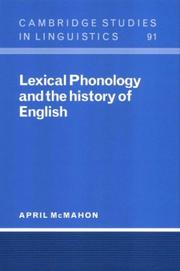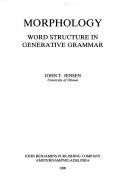| Listing 1 - 8 of 8 |
Sort by
|
Book
ISBN: 9780748624614 9780748630554 9781474408158 0748624619 0748630554 147440815X Year: 2015 Publisher: Edinburgh: Edinburgh University Press in association with The Aga Khan University,
Abstract | Keywords | Export | Availability | Bookmark
 Loading...
Loading...Choose an application
- Reference Manager
- EndNote
- RefWorks (Direct export to RefWorks)
A monograph about structural entities originating in the lexicon - that is, about word structure - as well as about the structural characteristics of the lexicon as a module of formal grammar.
Lexicology. Semantics --- English language --- Grammar --- Word formation --- Compound words --- Lexical phonology --- Lexical grammar --- Generative grammar --- Grammar, Comparative and general --- Phonology --- Morphology --- Lexicology --- Germanic languages --- English language - Word formation --- English language - Compound words --- Lexical phonology. --- Lexical grammar. --- Word formation. --- Compound words.

ISBN: 1107112524 0511010028 1280416874 0511172370 0511150911 051148643X 0511310390 0511053053 9780511010026 0511037813 9780511037818 9780511053054 9780521472807 0521472806 9780511486432 9781280416873 9786610416875 6610416877 9780521034487 0521034485 9781107112520 9780511172373 9780511150913 9780511310393 Year: 2000 Publisher: Cambridge ; New York, NY : Cambridge University Press,
Abstract | Keywords | Export | Availability | Bookmark
 Loading...
Loading...Choose an application
- Reference Manager
- EndNote
- RefWorks (Direct export to RefWorks)
This book has two main goals: the re-establishment of a rule-based phonology as a viable alternative to current non-derivational models and the rehabilitation of historical evidence as a focus of phonological theory. Although Lexical Phonology includes several constraints such as the Derived Environment Condition and Structure Preservation, intended to reduce abstractness, previous versions have not typically exploited these fully. The model of Lexical Phonology presented here imposes the Derived Environment Condition strictly; introduces a new constraint on the shape of underlying representations; excludes underspecification; and suggests an integration of Lexical Phonology with Articulatory Phonology.
English language --- Lexical phonology. --- Generative grammar --- Grammar, Comparative and general --- Phonology, Historical. --- History. --- Phonology --- Phonetics, Diachronic --- Phonology, Diachronic --- Lexical phonology --- History --- Phonology, Historical --- Arts and Humanities --- Language & Linguistics --- Germanic languages --- ENGLISH LANGUAGE --- HISTORY
Book
ISBN: 311139283X 9783111392837 9783111030333 3111030334 Year: 2011 Volume: 17 Publisher: Berlin Boston
Abstract | Keywords | Export | Availability | Bookmark
 Loading...
Loading...Choose an application
- Reference Manager
- EndNote
- RefWorks (Direct export to RefWorks)
Cyclic and lexical phonology : the structure of Polish
Polish language --- Lexical phonology. --- Generative grammar --- Grammar, Comparative and general --- Polnisch language --- Polski language --- Lechitic languages --- Kashubian language --- Phonology. --- Grammar, Generative. --- Phonology
Book
ISBN: 0748630554 9780748630554 9780748624614 0748624619 9781474408158 147440815X Year: 2015 Publisher: Edinburgh
Abstract | Keywords | Export | Availability | Bookmark
 Loading...
Loading...Choose an application
- Reference Manager
- EndNote
- RefWorks (Direct export to RefWorks)
A monograph about structural entities originating in the lexicon - that is, about word structure - as well as about the structural characteristics of the lexicon as a module of formal grammar.
English language --- Lexical phonology. --- Lexical grammar. --- Generative grammar --- Grammar, Comparative and general --- Lexicology --- Word formation. --- Compound words. --- Phonology --- Morphology --- Germanic languages
Book
Year: 2017 Publisher: Frontiers Media SA
Abstract | Keywords | Export | Availability | Bookmark
 Loading...
Loading...Choose an application
- Reference Manager
- EndNote
- RefWorks (Direct export to RefWorks)
A conversation between two people can only take place if the words intended by each speaker are successfully recognized. Spoken word recognition is at the heart of language comprehension. This automatic and smooth process remains a challenge for models of spoken word recognition. Both the process of mapping the speech signal onto stored representations for words, and the format of the representation themselves are subject to debate. So far, existing research on the nature of spoken word representations has focused mainly on native speakers. The picture becomes even more complex when looking at spoken word recognition in a second language. Given that most of the world’s speakers know and use more than one language, it is crucial to reach a more precise understanding of how bilingual and multilingual individuals encode spoken words in the mental lexicon, and why spoken word recognition is more difficult in a second language than in the native language. Current models of native spoken word recognition operate under two assumptions: (i) that listeners’ perception of the incoming speech signal is optimal; and (ii) that listeners’ lexical representations are accurate. As a result, lexical representations are easily activated, and intended words are successfully recognized. However, these assumptions are compromised when applied to a later-learned second language. For a variety of reasons (e.g., phonetic/phonological, orthographic), second language users may not perceive the speech signal optimally, and they may still be refining the motor routines needed for articulation. Accordingly, their lexical representations may differ from those of native speakers, which may in turn inhibit their selection of the intended word forms. Second language users also have to solve a larger selection challenge—having words in more than one language to choose from. Thus, for second language users, the links between perception, lexical representations, orthography, and production are all but clear. Even for simultaneous bilinguals, important questions remain about the specificity and interdependence of their lexical representations and the factors influencing cross-language word activation. This Frontiers Research Topic seeks to further our understanding of the factors that determine how multilinguals recognize and encode spoken words in the mental lexicon, with a focus on the mapping between the input and lexical representations, and on the quality of lexical representations.
Multilingualism --- Bilingualism --- Lexical phonology. --- Psychological aspects. --- Phonological knowledge --- Second-language speech --- bilingual and bidialectal lexicon --- spoken word recognition --- lexical access --- orthographic knowledge
Book
ISBN: 9789027203632 9027203636 9027271917 9789027271914 1299662145 9781299662148 9789027206633 9789027265241 9027265240 Year: 2013 Volume: v. 57 Publisher: Amsterdam: John Benjamins,
Abstract | Keywords | Export | Availability | Bookmark
 Loading...
Loading...Choose an application
- Reference Manager
- EndNote
- RefWorks (Direct export to RefWorks)
This paper sets out to explore and evaluate several corpus search methods that are applied to uncover linguistic devices expressing 'quantity approximation' in a corpus of business English from an onomasiological perspective. The study is carried out within the framework of a project exploring quantity approximation in various business genres using a contrastive, corpus-driven approach (in Dutch, English and French). The paper sheds light on the advantages and disadvantages of using annotated corpora (part-of-speech and semantic tagging) and automatically extracted word lists for onomasiologic
Corpora (Linguistics) --- Lexicology. --- Lexical phonology. --- Grammaticality (Linguistics) --- Linguistic analysis (Linguistics) --- Corpus (Linguistique) --- Lexicologie --- Phonologie lexicale --- Grammaticalité --- Analyse linguistique (Linguistique) --- Lexicology --- Lexical phonology --- Linguistic analysis --- Grammaticalité --- English language --- Language and languages --- Generative grammar --- Grammar, Comparative and general --- Grammaticalness (Linguistics) --- Acceptability (Linguistics) --- Linguistics --- Corpus-based analysis (Linguistics) --- Corpus linguistics --- Phonology --- Analysis, Linguistic (Linguistics) --- Analysis (Philosophy)

ISBN: 9027235678 9786613313621 1283313626 9027278296 9789027278296 1556191251 9781556191251 155619126X 9781556191268 9789027235671 9027235686 9789027235688 9781283313629 6613313629 Year: 1990 Publisher: Amsterdam Benjamins
Abstract | Keywords | Export | Availability | Bookmark
 Loading...
Loading...Choose an application
- Reference Manager
- EndNote
- RefWorks (Direct export to RefWorks)
A self-contained and lively text prepared in response to a perceived need for an up-to-date introduction to the field of morphology within the framework of generative grammar. The material is presented in the framework of the lexicalist hypothesis of Chomsky (1970), but also taking in the more recent development of lexicalist phonology and morphology in the works of Paul Kiparsky and others. Other approaches are recognized, but the use of one unified, consistent theory pushed to its limit makes for a better student text. Each chapter includes a list of terms, of further reading, and a number o
Grammar --- Grammar, Comparative and general --- Generative grammar. --- Lexical phonology. --- Latin language --- Generative grammar --- Grammar, Generative --- Grammar, Transformational --- Grammar, Transformational generative --- Transformational generative grammar --- Transformational grammar --- Psycholinguistics --- Linguistics --- Philology --- Morphology. --- Verb. --- Phonology --- Derivation --- Grammar, Comparative and general Morphology --- Morphology
Multi
ISBN: 9780521762342 9780511980503 0511980507 9781107416352 1107416353 0521762340 1107423597 9781107423596 1107438888 9781107438880 1107421713 9781107421714 1107419042 9781107419049 1107420318 9781107420311 1108790674 Year: 2013 Publisher: Cambridge Cambridge University Press
Abstract | Keywords | Export | Availability | Bookmark
 Loading...
Loading...Choose an application
- Reference Manager
- EndNote
- RefWorks (Direct export to RefWorks)
How well have classic ideas on whole-word phonology stood the test of time? Waterson claimed that each child has a system of their own; Ferguson and Farwell emphasised the relative accuracy of first words; Menn noted the occurrence of regression and the emergence of phonological systematicity. This volume brings together classic texts such as these with current data-rich studies of British and American English, Arabic, Brazilian Portuguese, Finnish, French, Japanese, Polish and Spanish. This combination of classic and contemporary work from the last 30 years presents the reader with cutting-edge perspectives on child language by linking historical approaches with current ideas such as exemplar theory and usage-based phonology and contrasting state-of-the-art perspectives from developmental psychology and linguistics. This is a valuable resource for cognitive scientists, developmentalists, linguists, psychologists, speech scientists and therapists interested in understanding how children begin to use language without the benefit of language-specific innate knowledge.
Phonetics --- Lexical phonology. --- Grammar, Comparative and general --- Reading --- Language and languages --- Visual learning. --- Complexity (Linguistics) --- Phonology. --- Morphology. --- Language experience approach. --- Study and teaching. --- Complexity (Linguistics). --- Linguistic analysis (Linguistics) --- Learning, Visual --- Learning --- Foreign language study --- Language and education --- Language schools --- Language experience approach in education --- Morphology (Linguistics) --- Phonology --- Generative grammar --- Whole language approach --- Lexical phonology --- Visual learning --- Morphology --- Language experience approach --- Study and teaching --- E-books --- Arts and Humanities --- Language & Linguistics --- Linguistics --- Philology --- Language and languages Study and teaching --- Grammar, Comparative and general Morphology --- Grammar, Comparative and general Phonology
| Listing 1 - 8 of 8 |
Sort by
|

 Search
Search Feedback
Feedback About UniCat
About UniCat  Help
Help News
News